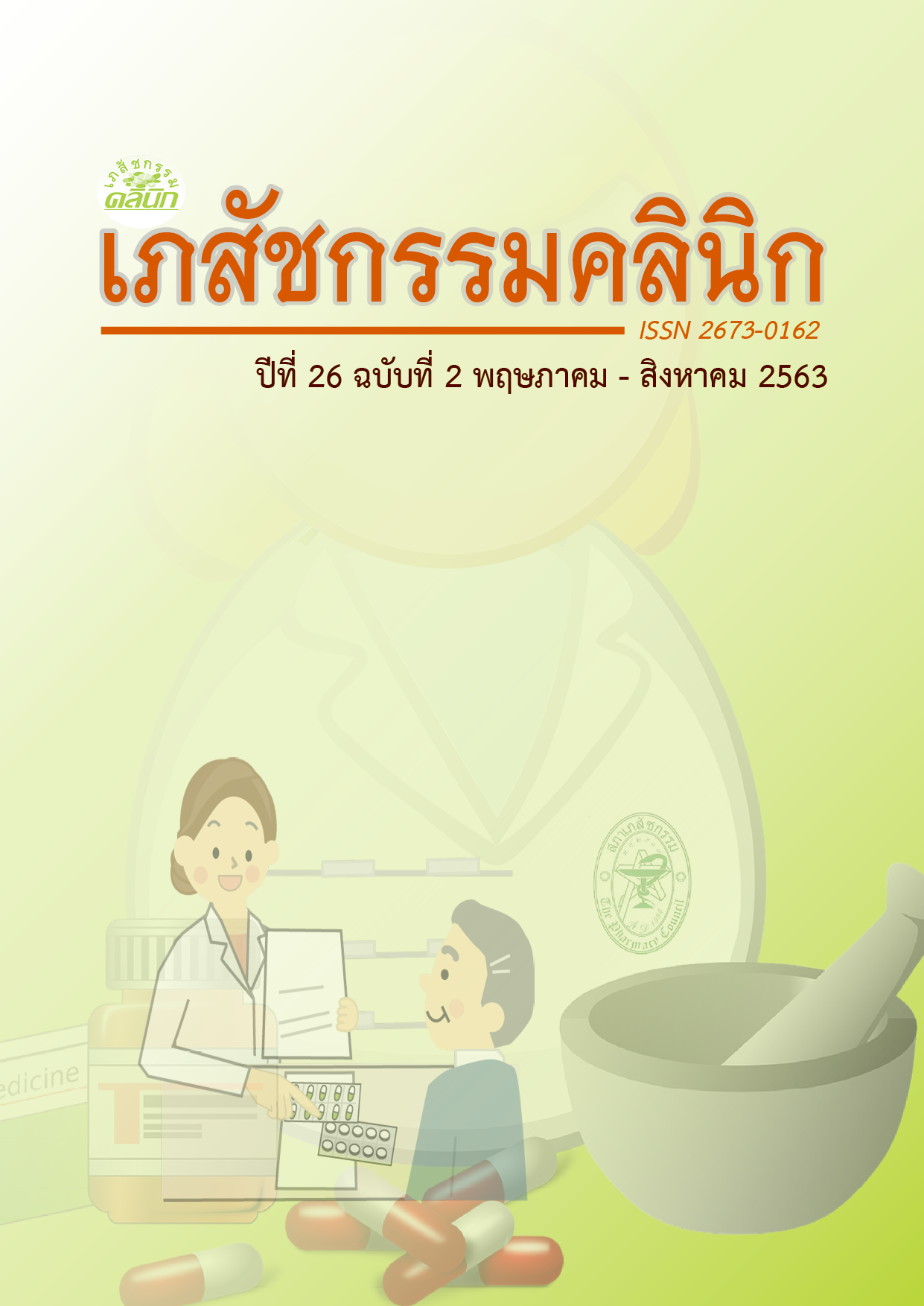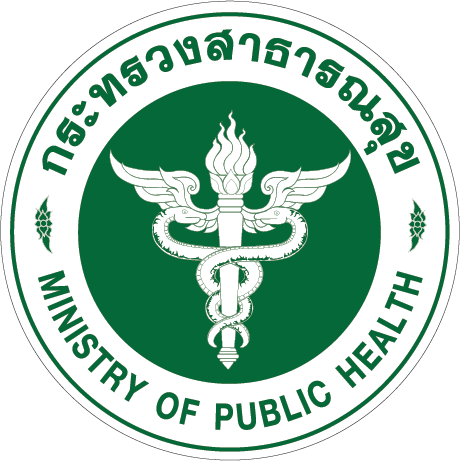ผลของมาตรการหยุดคำสั่งใช้ยาปฏิชีวนะอัตโนมัติในผู้ป่วยที่ติดเชื้อระบบทางเดินปัสสาวะ ณ โรงพยาบาลพัทลุง
คำสำคัญ:
หยุดคำสั่งใช้ยาอัตโนมัติ, หยุดคำสั่งใช้ยาปฏิชีวนะอัตโนมัติ, โรคติดเชื้อระบบทางเดินปัสสาวะบทคัดย่อ
วัตถุประสงค์: เพื่อศึกษาเปรียบเทียบระยะเวลาการใช้ยาปฏิชีวนะ และผลการรักษาในผู้ป่วยที่ติดเชื้อระบบทางเดินปัสสาวะที่นอนพักรักษาตัวในโรงพยาบาล กลุ่มก่อนใช้และหลังใช้มาตรการหยุดคำสั่งใช้ยาปฏิชีวนะอัตโนมัติ
วิธีวิจัย: เป็นการศึกษาข้อมูลย้อนหลังในผู้ป่วยติดเชื้อระบบทางเดินปัสสาวะที่นอนพักรักษาตัวในโรงพยาบาลพัทลุง โดยเปรียบเทียบระยะเวลาการใช้ยาปฏิชีวนะและผลการรักษาของผู้ป่วย 2 กลุ่ม คือ กลุ่มที่ 1 ผู้ป่วยก่อนใช้มาตรการหยุดคำสั่งใช้ยาปฏิชีวนะอัตโนมัติ (pre-antibiotic automatic stop order policy, Pre-ASO) และกลุ่มที่ 2 กลุ่มผู้ป่วยหลังใช้มาตรการหยุดคำสั่งใช้ยาปฏิชีวนะอัตโนมัติ (post-antibiotic automatic stop order policy, Post-ASO) วิเคราะห์ผลโดยใช้สถิติ Mann-whitney U-test ในการเปรียบเทียบจำนวนวันเฉลี่ยในการใช้ยาปฏิชีวนะของผู้ป่วย 2 กลุ่ม และใช้สถิติ Chi-square test ในการเปรียบเทียบผลการรักษาของผู้ป่วย 2 กลุ่ม
ผลการวิจัย: ผู้ป่วยที่เข้าร่วมการศึกษามีจำนวนทั้งหมด 280 ราย โดยผู้ป่วยแต่ละกลุ่มมีจำนวน 140 ราย ผลการศึกษาพบว่า จำนวนวันเฉลี่ยของการใช้ยาปฏิชีวนะในกลุ่ม Post-ASO น้อยกว่ากลุ่ม Pre-ASO อย่างมีนัยสำคัญทางสถิติ (5.22±2.166 vs 6.09±2.757 p-value = 0.002) สำหรับผลการรักษาทั้งสองกลุ่มไม่แตกต่างกัน (Post-ASO 168(98.8%) vs Pre-ASO 169(99.44%) p-value = 0.562)
สรุปผล: มาตรการหยุดคำสั่งใช้ยาปฏิชีวนะอัตโนมัติช่วยลดระยะเวลาการใช้ยาปฏิชีวนะในผู้ป่วยติดเชื้อระบบทางเดินปัสสาวะ โดยไม่ส่งผลกระทบต่อผลการรักษา
เอกสารอ้างอิง
กระทรวงสาธารณสุข, กระทรวงเกษตรและสหกรณ์. แผนยุทธศาสตร์การจัดการการดื้อยาต้านจุลชีพประเทศไทย พ.ศ. 2560-2564. สืบค้นจาก http://narst.dmsc.moph.go.th/documentation/AMR%20strategy%202560-2564.pdf : วันที่เข้าไปสืบค้นจาก June 12, 2020.
สำนักงานคณะกรรมการอาหารและยา.วิกฤตเชื้อดื้อยาสู่การใช้ยาอย่างสมเหตุผล. สืบค้นจาก:https://ccpe.pharmacycouncil.org/index.php?option=article_detail&subpage=article_detail&id=493 : วันที่เข้าไปสืบค้นจาก June 12, 2020.
ภานุมาศ ภูมาศ, วิษณุ ธรรมลิขิตกุล, ภูษิต ประคองสาย, ตวงรัตน์ โพธะ, อาทร ริ้วไพบูลย์, สุพล ลิมวัฒนานนท์. ผลกระทบด้านสุขภาพและเศรษฐศาสตร์จากการติดเชื้อดื้อยาต้านจุลชีพในประเทศไทย.วารสารวิจัยระบบสาธารณสุข 2555 ; 6 : 352-60
ภิญโญ รัตนาอัมพวัลย์. การส่งเสริมและกำกับการใช้ยาต้านจุลชีพอย่างเหมาะสมในโรงพยาบาล. พิมพ์ครั้งที่ 1. กรุงเทพฯ : สำนักพิมพ์ศิริราช, 2561 : 46-56
Schrag SJ, Peña C, Fernández J. et al. Effect of Short-Course, High-Dose Amoxicillin Therapy on Resistant Pneumococcal Carriage. JAMA. 2001 ; 286 : 49-56.
Desai S, Qin H, Rayburn P. et al. Implementation of an Automatic Stop Order and Initial Antibiotic Exposure in Very Low Birth Weight Infants. Am J Perinatol. 2016 ; 34 :105–10.
Astorga MC, Piscitello KJ, Menda N. et al. Antibiotic Stewardship in the Neonatal Intensive Care Unit: Effects of an Automatic 48-Hour Antibiotic Stop Order on Antibiotic Use. JPIDS. 2018 ; 8 : 310–6.
Bouadma L, Luyt CE, Tubach F. et al. Use of procalcitonin to reduce patients’ exposure to antibiotics in intensive care units (PRORATA trial): a multicentre randomised controlled trial. The Lancet. 2010 ; 375 : 463-74.
มรกต อนันต์วัฒนกิจ, แสง อุษยาพร, ธีระพงษ์ ตัณฑะวิเชียร, ชาญกิจ พุฒิเลอพงษ์, ธิติมา เพ็งสุภาพ. ผลของการมีเภสัชกรร่วมในโปรแกรมการเปลี่ยนแปลงและชี้นำการใช้ยาต้านจุลชีพต่อความเหมาะสมในการสั่งใช้ยาต้านจุลชีพ. วารสารไทยเภสัชศาสตร์และวิทยาการสุขภาพ. 2558 ; 10 : 1-9
Do J, Walker SAN, Walker SE, Cornish W, Simor AE. Audit of antibiotic duration of therapy, appropriateness and outcome in patients with nosocomial pneumonia following the removal of an automatic stop-date policy. Eur J of Clin Microbiol Infect Dis. 2012 ; 31 : 1819–31.
สำนักงานนิเทศและประชาสัมพันธ์ กระทรวงสาธารณสุข. สถานการณ์เชื้อดื้อยาปฏิชีวนะในไทย. สืบค้นจาก : http://narst.dmsc.moph.go.th/news001.html : วันที่เข้าไปสืบค้นจาก May 25, 2020.
ดาวน์โหลด
เผยแพร่แล้ว
วิธีการอ้างอิง
ฉบับ
บท
การอนุญาต
ลิขสิทธิ์ (c) 2022 กองบริหารการสาธารณสุข สำนักงานปลัดกระทรวงสาธารณสุข และ ชมรมเภสัชกรโรงพยาบาลกระทรวงสาธารณสุข

This work is licensed under a Creative Commons Attribution-NonCommercial-NoDerivatives 4.0 International License.
ข้อความภายในบทความที่ตีพิมพ์ในวารสารเภสัชกรรมคลินิกทั้งหมด รวมถึงรูปภาพประกอบ ตาราง เป็นลิขสิทธิ์ของกองบริหารการสาธารณสุข สำนักงานปลัดกระทรวงสาธารณสุข และ ชมรมเภสัชกรโรงพยาบาลกระทรวงสาธารณสุข การนำเนื้อหา ข้อความหรือข้อคิดเห็น รูปภาพ ตาราง ของบทความไปจัดพิมพ์เผยแพร่ในรูปแบบต่าง ๆ เพื่อใช้ประโยชน์ในเชิงพาณิชย์ ต้องได้รับอนุญาตจากกองบรรณาธิการวารสารเภสัชกรรมคลินิกอย่างเป็นลายลักษณ์อักษร
กองบริหารการสาธารณสุข สำนักงานปลัดกระทรวงสาธารณสุข และ ชมรมเภสัชกรโรงพยาบาลกระทรวงสาธารณสุข อนุญาตให้สามารถนำไฟล์บทความไปใช้ประโยชน์และเผยแพร่ต่อได้ โดยอยู่ภายใต้เงื่อนไขสัญญาอนุญาตครีเอทีฟคอมมอน (Creative Commons License: CC) โดย ต้องแสดงที่มาจากวารสาร – ไม่ใช้เพื่อการค้า – ห้ามแก้ไขดัดแปลง, Attribution-NonCommercial-NoDerivatives 4.0 International (CC BY-NC-ND 4.0)
ข้อความที่ปรากฏในบทความในวารสารเป็นความคิดเห็นส่วนตัวของผู้เขียนแต่ละท่านไม่เกี่ยวข้องกับกองบริหารการสาธารณสุข สำนักงานปลัดกระทรวงสาธารณสุข และ ชมรมเภสัชกรโรงพยาบาลกระทรวงสาธารณสุข และบุคลากรในกองฯ หรือ ชมรมฯ แต่อย่างใด ความรับผิดชอบองค์ประกอบทั้งหมดของบทความแต่ละเรื่องเป็นของผู้เขียนแต่ละท่าน หากมีความผิดพลาดใด ๆ ผู้เขียนแต่ละท่านจะรับผิดชอบบทความของตนเอง ตลอดจนความรับผิดชอบด้านเนื้อหาและการตรวจร่างบทความเป็นของผู้เขียน ไม่เกี่ยวข้องกับกองบรรณาธิการ




